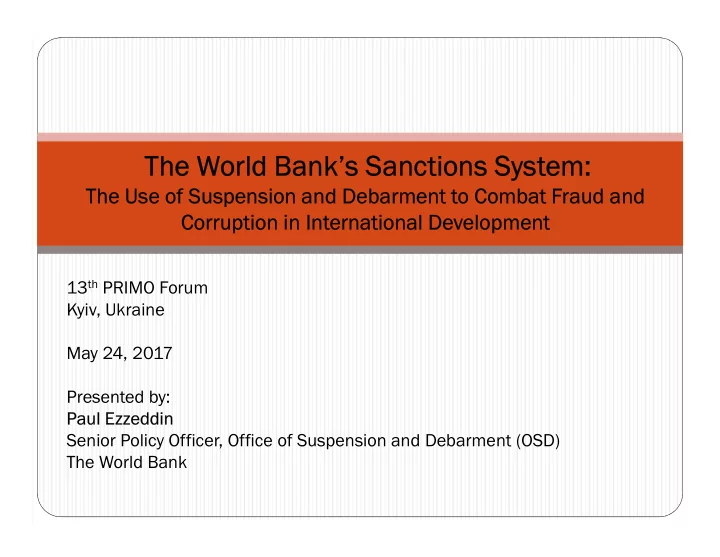

The World Bank’s Sanctions System: The Use of Suspension and Debarment to Combat Fraud and Corruption in International Development 13 th PRIMO Forum Kyiv, Ukraine May 24, 2017 Presented by: Paul Ezzeddin Senior Policy Officer, Office of Suspension and Debarment (OSD) The World Bank
Why Does the World Bank Care About Fraud & Corruption? Aid Anticorruption Effectiveness Procurement 2
Why Integrity in Procurement Matters Infrastructure Project (East Asia Pacific) • Road 30% narrower than specifications • No road surfacing, contrary to specifications • The contract was paid in full 3
Why Integrity in Procurement Matters 4
Why Integrity in Procurement Matters 30 days to completion – more than 50% of funds disbursed 5
Along with Prevention, Deterrence: The World Bank’s Sanctions System At the World Bank, “sanctions” means suspension and debarment Suspensions and debarments imposed by the World Bank are administrative remedies, not criminal sanctions One of a number of tools that the World Bank uses to combat fraud and corruption Suspended and debarred companies/individuals are ineligible to receive new contracts for World Bank-financed projects 6
World Bank Financing: How Are The Parties Related ? Companies and The World Individuals INVESTIGATIONS, Bank (Bidders / AUDITS, SANCTIONS Contractors) CONTRACTS, FINANCING/ CREDIT BIDDING AGREEMENT DOCUMENTS IMPLEMENTING AGENCY (Borrowing Country Government) 7
Who Can Be Sanctioned? Companies / Individuals competing for, or executing, Bank-financed contracts Covered by the World Bank Sanctions System May be suspended/debarred from receiving new contracts Actors Covered by Other WB Systems • Bank staff members and consultants (World Bank Internal Justice Bank staff members and consultants (World Bank Internal Justice System) – Under the Internal Justice System, misconduct may result in termination, blacklisting against future employment with the World Bank • Government agencies and officials (Referrals to Member governments) – Evidence of misconduct by government agencies and officials is referred to member governments 8
Sanctionable Misconduct The World Bank has defined five sanctionable practices: Fraudulent Practice Corrupt Practice Collusive Practice Coercive Practice Obstructive Practice Definitions found in: Loan, Grant and Contracting Documents (via Consultant and Procurement Guidelines (old) and Procurement Regulations (new); Sanctions Procedures; Anti-Corruption Guidelines for Borrowing Countries) Applies across the World Bank Group (IBRD/IDA, IFC, MIGA) First four definitions are harmonized with other Multilateral Development Banks (IDB, ADB, AfDB, EBRD) 9
Sanctions System Overview INVESTIGATIVE ADJUDICATIVE COMPLIANCE Integrity Vice Suspension and Debarment Sanctions Board Integrity Compliance Presidency (INT) Officer (SDO) (SB) Officers (ICO) • Investigates allegations of • Determines sufficiency of evidence • If respondents appeal, • Monitors integrity sanctionable practices in of sanctionable practices in SAEs reviews cases de novo . compliance by sanctioned World Bank-financed presented by INT. • Comprised of 7 external companies (or codes of projects. • Issues Notices of Sanctions members (including chair). conduct for individuals). • Prepares and submits Proceedings (Notices) to • May hold hearings with • Decides whether Statements of Accusations respondents. parties and witnesses. compliance condition(s) and Evidence (SAEs) to the • Temporarily suspends respondents Determines if sanctionable established by the SDO or • SDO. pending final outcome of practices occurred. Sanctions Board as part of Evaluates evidence presented by INT proceedings. • Imposes sanctions (not bound a sanction have been Issues Notice of Sanctions Proceedings to respondent • Recommends sanctions (become by SDO’s recommendations). satisfied. Temporarily suspends respondent effective if respondents do not • Decisions are final and not contest). appealable. Recommends a sanction (becomes effective if respondent • Reviews Explanations submitted by • 34% of cases resolved at this does not contest) respondents in response to Notices. level. 67% of cases resolved at this level • 66% of cases resolved at this level. 10
Range of Sanctions Debarment with Conditional Release (‘baseline’ or default) Indefinite or Fixed-Term Debarment (without conditions) Conditional Non-Debarment Letter of Reprimand Restitution or other Remedy 11
Scope of Debarment Suspended/debarred companies and individuals are not eligible to receive new contracts for World Bank projects Also cannot be a nominated sub-contractor, consultant, supplier, or service provider of an otherwise eligible firm being awarded a World Bank-financed contract In most instances, entities controlled by a debarred company or individual (i.e., subsidiaries) will also be ineligible Suspensions/debarments can also extend to other affiliates (e.g., parents, affiliates under common control) under certain circumstances 12
MDB Cross-Debarment In March 2010 the WBG and four other MDBs signed an agreement for the mutual enforcement of debarment decisions Covers debarments that are public, over one year Harmonized definitions of sanctionable practices Cross-debarment automatic, subject to ‘opt out’ in exceptional cases on legal/policy grounds 13
The Compliance Phase: Conditional Release Integrity Compliance Office WBG Eligible Notify Sanctioned Ongoing Sanction Evaluate Party of Release Program Decision Program Conditional Decision Monitoring Release Application Process Rejected; May Appeal to Sanctions Board 14
Sanctions are Public www.worldbank.org/debarr 15
Sanctions are Published 16
17
World Bank Suspension and Debarment: By the Numbers Since 1999… 800+ firms and individuals publicly debarred 400+ firms and individuals temporarily suspended At least 35 criminal convictions based on referrals For more information on suspension and debarment at the World Bank, 18 please visit www.worldbank.org/sanctions
Debarment Systems: Lessons and Questions The Purpose of the System Must Be Clear: Is the system punitive? Or is the focus on rehabilitation/self-cleansing? Is it focused on the past (adjudicating misconduct), or the future (looking at present responsibility)? What is the balance between deterrence and fostering maximum competition? Is a suspension/debarment seen as a “good result” or a “bad result”? Context Matters: Is suspension and debarment one among a number of available remedies? Or is it your only available remedy? MDBs: Tension between competing legal systems and perspectives /standards of member countries 19
Debarment Systems: Lessons and Questions Practical Questions: What is the right balance between certainty and efficiency? How many levels of review? Who is the decision-maker? Is authority/accountability clear? What are the grounds? Fraud and corruption? Poor Performance? What is the evidentiary standard? Other key criteria? What due process rights are afforded to the accused party? What are the right performance measures for the system? 20
Recommend
More recommend